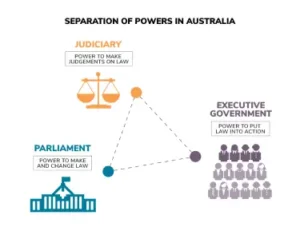Description
Explore the true nature of Australias democracy by examining its electoral system, media influence, and corporate power.
Introduction
Australia is often celebrated for its robust democratic framework, yet many question the true nature of its democracy. The ideal of democracy hinges on fair representation, accountability, and active public participation. However, numerous factors suggest that Australia’s democracy might not be as genuine as it appears. This article delves into these concerns, analysing the electoral system, media influence, corporate power, and public participation to figure out if Australia truly has a democracy.
Historical Context of Australian Democracy
Early Development
Australia’s democratic journey began with the establishment of self-governing colonies in the mid-19th century, leading to the Federation in 1901. This period saw significant milestones, including the introduction of compulsory voting and women’s suffrage, making Australia a pioneer in democratic practices.
Key Milestones
– Federation (1901): Unification of the colonies into the Commonwealth of Australia.
– Women’s Suffrage (1902): Australia became one of the first countries to grant women the right to vote and stand for parliament.
– Indigenous Rights: The struggle for Indigenous voting rights culminated in 1962 when all Indigenous Australians were granted the right to vote in federal elections.
Evolution of Democratic Institutions

Australia’s democratic institutions, including the Parliament, electoral system, and judiciary, have evolved to reflect the principles of democracy. However, the integrity and effectiveness of these institutions in standing for the people’s will are increasingly questioned.
Electoral System: Fair Representation or Flawed Mechanism?
Voting System
Australia uses a preferential voting system designed to ensure that elected representatives have majority support. While this system is lauded for its fairness, it has its drawbacks, including complexity and potential voter confusion.
Gerrymandering and Electoral Boundaries
Electoral boundaries are periodically redrawn, ideally to reflect population changes. However, gerrymandering—manipulating boundaries for political advantage—is still a concern, potentially undermining fair representation.
Influence of Political Donations
Political donations significantly affect election outcomes. Wealthy individuals and corporations can influence policies and decisions through substantial contributions, raising questions about the integrity of the democratic process.
Case Studies
– 2016 Federal Election: Highlighted issues with political donations and the influence of corporate interests on policymaking.
Media Influence: Fourth Estate or Propaganda Tool?
Media Ownership
Australia’s media landscape is highly concentrated, with a few major corporations controlling most news outlets. This concentration raises concerns about media bias and its impact on democracy.
Role of Public Broadcasters
Public broadcasters like ABC and SBS are intended to provide balanced and unbiased reporting. However, they often face political pressure, affecting their ability to serve the public interest effectively.
Media Bias and Its Impact on Public Opinion
Media bias can shape public opinion and influence electoral outcomes. The alignment of major news outlets with specific political ideologies further complicates the media’s role in a democracy.
Case Studies
– 2019 Federal Election: Analysis of media coverage and its impact on voter perceptions and election results.
Corporate Influence: Democracy for Sale?
Lobbying
Lobbying is a widespread practice where corporations and interest groups look to influence policy and decision-making. While lobbying is a legitimate aspect of democratic systems, excessive corporate influence can undermine the public interest.
Revolving Door Between Politics and Business

The revolving door phenomenon, where politicians move between public office and corporate roles, raises concerns about conflicts of interest and the prioritization of corporate over public interests.
Case Studies
– Mining and Fossil Fuel Industries: Examples of how corporate lobbying has shaped policies, often at the expense of environmental and public health.
Indigenous Rights: A Democracy for All?
Historical Disenfranchisement
Indigenous Australians were historically excluded from the democratic process, with full voting rights only granted in the 1960s. This disenfranchisement has had long-lasting impacts on Indigenous representation and policy outcomes.
Current Challenges
Indigenous Australians continue to face barriers to full participation in the democratic process, including lower voter turnout and underrepresentation in Parliament.
Case Studies
– 2017 Uluru Statement from the Heart: A call for constitutional recognition and a voice in Parliament for Indigenous Australians, highlighting ongoing struggles for representation.
Public Participation: True Engagement or Tokenism?
Mechanisms for Public Involvement
Australia has various mechanisms for public involvement, including petitions, public consultations, and referendums. However, the effectiveness and accessibility of these mechanisms are often questioned.
Effectiveness and Accessibility
While mechanisms for public participation exist, their impact is often limited by bureaucratic processes and lack of genuine engagement from decision-makers.
Case Studies
– Same-Sex Marriage Postal Survey (2017): A notable instance of public participation leading to significant policy change.
Accountability and Transparency: Pillars of Democracy?
Government Accountability
Accountability mechanisms, such as parliamentary oversight and independent watchdogs, are crucial for supporting democratic integrity. However, their effectiveness is often compromised by political interference and lack of resources.
Transparency in Decision-Making
Transparency is essential for informed public participation and accountability. Despite commitments to open government, there are persistent issues with access to information and transparency in decision-making processes.
Whistleblower Protections
Whistleblower protections are critical for exposing wrongdoing and supporting public trust. However, Australian laws are often criticized for being inadequate and not protecting whistleblowers effectively.
Case Studies
– Robodebt Scheme: A controversial government initiative that highlighted significant issues with accountability and transparency.
Comparing Australia to Other Democracies
International Benchmarks
Comparing Australia to other established democracies can provide insights into its strengths and areas for improvement. Metrics such as the Global Democracy Index offer valuable perspectives.
Global Democracy Index
Australia consistently ranks highly on the Global Democracy Index, but there are areas where it lags, particularly concerning political participation and civil liberties.
Lessons from Abroad: Enhancing Australia’s Democratic Processes
Examining practices from other democracies can highlight potential reforms for enhancing Australia’s democratic processes.
1. New Zealand: Proportional Representation
Practice: Mixed-Member Proportional (MMP) Voting System
– Description: New Zealand uses an MMP system, which combines proportional representation with single-member districts. Voters have two votes: one for a political party and one for a local candidate. This system ensures that the overall composition of the parliament more accurately reflects the voters’ preferences.
Potential Reform for Australia:
– Adoption of a Proportional Voting System: Implementing a similar proportional representation system in Australia could lead to fairer representation, reducing the dominance of major parties and allowing smaller parties and independent candidates to have a more significant impact.
2. Sweden: High Levels of Government Transparency
Practice: Freedom of Information and Public Access to Government Data
– Description: Sweden’s principle of public access to official documents (Offentlighetsprincipen) allows citizens to access government documents and promotes transparency. This openness helps to ensure government accountability and public trust.
Potential Reform for Australia:
– Enhanced Freedom of Information (FOI) Laws: Strengthening FOI laws in Australia to ensure prompt and comprehensive access to government documents could increase transparency and trust in the political system.
3. Switzerland: Direct Democracy
Practice: Frequent Use of Referendums and Citizen Initiatives
– Description: Switzerland’s system of direct democracy allows citizens to take part directly in decision-making through referendums and initiatives. Citizens can propose new laws or changes to the constitution, which are then voted on in national referendums.
Potential Reform for Australia:
– Increased Use of Referendums and Citizen-Initiated Legislation: Introducing mechanisms for more frequent referendums and citizen-initiated legislation in Australia could enhance public participation and ensure that significant policy decisions reflect the will of the people.
4. Germany: Strong Whistleblower Protections
Practice: Comprehensive Whistleblower Protection Laws
– Description: Germany has robust laws that protect whistleblowers who expose corruption, fraud, and other illegal activities. These laws ensure that whistleblowers are safeguarded from retaliation and that their disclosures lead to proper investigations.
Potential Reform for Australia:
– Strengthening Whistleblower Protections: Implementing stronger legal protections for whistleblowers in Australia could encourage the reporting of misconduct and enhance government accountability.
5. Canada: Political Financing Reforms
Practice: Strict Limits on Political Donations and Spending
– Description: Canada has implemented stringent rules on political donations, including limits on the amount individuals can contribute and bans on corporate and union donations. Public financing is also provided to support political parties.
Potential Reform for Australia:
– Reforming Political Financing: Adopting similar limits on political donations and introducing public financing for campaigns could reduce the influence of wealthy donors and ensure a more level playing field in Australian elections.
6. Iceland: Citizen Assemblies for Constitutional Reform
Practice: Citizen-Driven Constitutional Reform Process
– Description: Iceland engaged its citizens in drafting a new constitution through national forums and online platforms. This participatory approach allowed ordinary citizens to contribute to the constitution’s content.
Potential Reform for Australia:
– Citizen Assemblies for Policy Development: Using citizen assemblies for major policy decisions or constitutional reforms in Australia could increase public engagement and ensure that policies reflect diverse perspectives and interests.
By examining these practices from other democracies, Australia can gain valuable insights and consider implementing reforms that enhance its democratic processes. These examples illustrate how different approaches to representation, transparency, participation, and accountability can contribute to a more robust and inclusive democracy.
Conclusion
Australia’s democracy, while robust in many respects, faces significant challenges. Issues like media concentration, corporate influence, and inadequate representation for Indigenous Australians and other marginalized groups highlight the need for ongoing reforms. By addressing these concerns, Australia can move towards a more inclusive and genuine democratic system.
Question for Readers
Do you believe Australia’s democratic system reflects the will of its people? Share your thoughts and experiences in the comments below.
Call to Action
Get involved in advocating for a more transparent and accountable democratic system in Australia. Join the conversation today and make your voice heard.
Social Sharing
If you found this article informative, please share it with your contacts and on social media to spread awareness about the true nature of democracy in Australia.
References
Australian Electoral Commission. (n.d.). Preferential Voting. Retrieved from [AEC Website]: https://www.aec.gov.au/Voting/Preferential_Voting.htm
ABC News. (2019). Election 2019: Media Bias and Influence. Retrieved from [ABC News]: https://www.abc.net.au/news/2019-05-19/election-2019-media-bias-influence/11124728
Transparency International Australia. (2021). Lobbying in Australia. Retrieved from [Transparency International Australia]: https://www.transparency.org.au/our-work/lobbying-in-australia/



Hi Alex, thank you for your question. There does not appear to be any federally, but here are some others:
Yes, community consultation is increasingly explored and implemented in Australia, similar to the models seen in Sweden. Several organizations and local governments actively engage in community consultation to ensure that citizens have a voice in decision-making processes. Here are a few examples:
1. Local Governments: Many local councils, such as the Brisbane City Council, regularly conduct community consultations on urban planning, development projects, and policy changes. They often use online platforms, public meetings, and surveys to gather input from residents.
2. Non-Profit Organizations: Groups like the Foundation for Rural & Regional Renewal (FRRR) and Community Engagement Australia focus on involving communities in decision-making to address local issues effectively.
3. State Governments: Various state governments have dedicated community engagement portals. For instance, the New South Wales Government runs the “Have Your Say” platform, inviting citizens to contribute their opinions on diverse matters, from health services to infrastructure projects.
4. Educational Institutions: Universities and research institutions often conduct studies and pilot projects on effective community consultation methods to enhance civic participation.
I have a colleague/friend who is working on a system here: https://dicksonreps.jigsy.com/ but it’s not completed yet and then we have to get governments to adopt it.
Excellent article, I am curious as to whether there are organisations exploring the community consultation idea (Sweden) here in Australia ?
You’re welcome, Janet. Yes, I think Australia could improve a lot if we had visionary leaders and the political will. It will take people power to bring about this change I image.
Thank you for this very informative and well structured article on Australia’s democracy. The format is presented in an ‘easy to read and comprehend’ way, and would be great if it was introduced in schools. All of the recommendations are excellent, what a wonderful country Australia would be if they were all enacted.